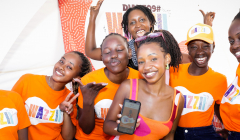
The role of young voices in creating inclusive brands
Listening to and learning from young people can help bands achieve more authentic inclusion

The campaign spotlights gendered language bias and champions freedom in play to help girls reach their full creative potential

A new global study from the LEGO Group has revealed girls feel intense pressure to be perfect and with three quarters of girls aspiring to work in creative industries. A new film spotlights the creative possibilities that are unlocked when girls are free to play unstoppable.
Sector
Toys & GamesThe pressure to be perfect is harming young girls' creativity.
A study from Lego surveyed 61,500 parents and children aged 5-12 years old, across 36 countries. It found that girls as young as five are being impacted by language bias, with the pressure to be perfect resulting in a fear of failure.
To free girls from this pressure and encourage freedom within creativity, Lego’s More Than Perfect campaign encourages audiences to be more careful about the language they use, demonstrating how it can impact a child’s creative confidence.
While at a young age, three quarters of girls (76%) feel confident in their creativity. This declines as they get older; two-thirds of girls often feel worried about sharing their ideas. Lego believes that this can change if people are more careful about the language they use, ensuring they enable creative thinking, rather than stifling ideas through a pursuit of perfection. The campaign reinforces the idea that by changing our language we can help change the future.
Young girls are particularly impacted by language bias, as the words people use can reinforce harmful stereotypes. Findings show that society is around 7x more likely to attribute terms like ‘sweet’, ‘pretty’, ‘cute’ and ‘beautiful’ exclusively to girls. While terms such as ‘brave’, ‘cool’, ‘genius’ and ‘innovative’ are twice as likely to be attributed exclusively to boys.
Harvard-trained parenting researcher and bestselling author, Jennifer B Wallace says, “What we say early sets in deep. Biased language reinforces traditional gender roles, which can play a role in limiting girls' creativity and perpetuating systemic inequalities”.
She continues: “It can confine them to narrow categories, such as valuing aesthetics over innovation. This implicit bias can hamper girls' confidence and restrict their opportunities in male-dominated fields. Challenging these biases is essential for fostering an inclusive society where girls can fully explore their creative potential. Every girl deserves the freedom to explore her creativity without fear or pressure”.
Wallace has worked alongside Lego to launch a ‘10 Steps to Fostering Creative Confidence’ guide for families to nurture creative confidence through play. The guide aims to help equip parents with fun tips to support creative development.
The findings of the research have been brought to life in a heartwarming campaign video which shows young girls and their parents sharing their experiences with perfection.
The film shows young girls told to make a ‘perfect Lego playground’ which leads to anxiety and cautious creativity, before being told to make ‘any Lego playground’ they want, with no right or wrong outcome. The second task resulted in far more fun and creative experimentation. The young girls and their parents then discuss how striving to be perfect makes them feel, with the heartfelt responses around a fear of failure striking a chord with creatives at every age.
The video reinforces the findings of the study and encourages parents to think carefully about how they communicate creativity to their children. The campaign underlines that creativity is ‘more than perfect’ and inserts other adjectives to describe creativity such as ‘cool’, ‘inspiring’, ‘innovative’ and ‘clever’.
As well as encouraging young girls to be more creative and reach their full potential through the campaign film, Lego has also released a range of practical resources.These are from the language guide with Wallace, for its rollout of new free creative workshops in Lego stores and online aimed at young creators between 6-12. Developed to showcase the power of freedom the workshops focus on space, gaming, dreams and imagination.
As part of the campaign, the brand is also committing to broadening its inclusion and gender equality across all products and content. The move is with support from an ongoing partnership with the Geena Davis Institute on Gender in Media.
By shining a light on the pressures put on young girls, Lego harnesses the power of play to build confidence. Highlighting the importance of creative freedom, the campaign enables young girls to be curious and explore, shunning society's limitations to help them reach their full potential.
Looks like you need to create a Creativebrief account to perform this action.
Create account Sign inLooks like you need to create a Creativebrief account to perform this action.
Create account Sign in